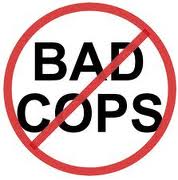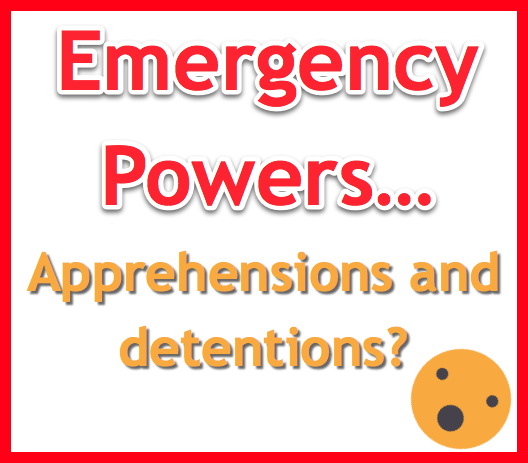

B.C. Apprehensions and Health Detention Ready To Go
A power to apprehend and detain a person for health reasons has been in force since at least 2009 (I have not checked for any earlier or direct comparison changes with today’s although the specific section 49 appears the same now as 2009).
This Act, in combination with a “declared state of emergency”, which presently is declared, and the recent federal call for proposals on the building of new “detention facilities” makes one go, hmmmm.
So, this is not new, but….. will it be used more freely now, is the question…? Let’s hope not.
B.C. has emergency powers to take a person and hold them in a facility if they are deemed to be a threat to public health. [below videos]
Christine Van Geyn – Civil Liberties and Covid-19 Webinar
COVID-19: Emergency Powers and Legal Principle
Here’s a link to the latest order for the B.C. “state of emergency” orders:
Nov. 11, 2020: New Two Week “Lockdown” Order
FIRST VERSION of the Act: Public Health Act, SBC 2008, c 28, <http://canlii.ca/t/jwp1>
SAME LEGAL DOCUMENTS DOWNLOADS FROM THIS SITE
- certificate-to-detain-a-person
- application-court-public-health
- Word Document outlining process – gn_people_who_are_a_danger_nov_314
SEARCH BC Gov’t Website “public health act”
[BC Act In force Now] SBC 2008, c 28 Public Health Act, , <http://canlii.ca/t/531m8>
[BC Regulations for Above Act] BC Reg 167/2018 – Reporting Information Affecting Public Health Regulation, , <http://canlii.ca/t/5451h>
B.C. Act Excerpts
Public Health Act, SBC 2008, c 28, <http://canlii.ca/t/jwp1>
Part 5 — Emergency Powers
Division 1 — Application of this Part
Definitions for this Part
51 In this Part:
“emergency” means a localized event or regional event that meets the conditions set out in section 52 (1) or (2) [conditions to be met before this Part applies], respectively;
“localized event” means an immediate and significant risk to public health in a localized area;
“regional event” means an immediate and significant risk to public health throughout a region or the province.
Division 6 — Enforcement of Orders
Conditions to be met before this Part applies
52 (1) A person must not exercise powers under this Part in respect of a localized event unless the person reasonably believes that
(a) the action is immediately necessary to protect public health from significant harm, and
(b) compliance with this Act, other than this Part, or a regulation made under this Act would hinder that person from acting in a manner that would avoid or mitigate an immediate and significant risk to public health.
(2) Subject to subsection (3), a person must not exercise powers under this Part in respect of a regional event unless the provincial health officer provides notice that the provincial health officer reasonably believes that at least 2 of the following criteria exist:
(a) the regional event could have a serious impact on public health;
(b) the regional event is unusual or unexpected;
(c) there is a significant risk of the spread of an infectious agent or a hazardous agent;
(d) there is a significant risk of travel or trade restrictions as a result of the regional event.
(3) If the provincial health officer is not immediately available to give notice under subsection (2), a person may exercise powers under this Part until the provincial health officer becomes available.
Warrants
47 (1) Without notice to any person, a health officer may apply, in the manner set out in the regulations, to a justice of the peace for an order under this section.
(2) A justice of the peace may issue a warrant in the prescribed form authorizing a health officer, or a person acting on behalf of a health officer, to enter and search a place, including a private dwelling, and take any necessary action if satisfied by evidence on oath or affirmation that it is necessary for the purposes of
(a) taking an action authorized under this Act, or
(b) determining whether an action authorized under this Act should be taken.
Injunctions
48 (1) Without notice to any person, a health officer may apply, in the manner set out in the regulations, to a judge of the Supreme Court for an order under this section.
(2) A judge of the Supreme Court may grant an injunction restraining a person from contravening, or requiring a person to comply, with
(a) a provision of this Act or a regulation made under it, or
(b) a term or condition of the person’s licence or permit issued under this Act, or an order made under this Act,
if satisfied by evidence on oath or affirmation that there has been or will be a contravention of this Act, the regulations, the licence, the permit or the order.
(3) A judge of the Supreme Court may order a person to do or refrain from doing those things the judge considers necessary if satisfied by evidence on oath or affirmation that the person is interfering with or obstructing, or will likely interfere with or obstruct, a person who is exercising powers or performing duties under this Act.
(4) A judge of the Supreme Court may grant an interim injunction or order until the outcome of an application commenced under this section.
Application to court if danger to public health
49 (1) To obtain an order under this section, a medical health officer may apply, in the manner set out in the regulations and with the approval of the provincial health officer, to a judge of the Provincial Court.
(2) Subject to the regulations, a judge of the Provincial Court, on receiving an application, may make an order under subsection (3) if satisfied by evidence on oath or affirmation that
(a) a person is an infected person,
(b) either
(i) the person has contravened an order of the medical health officer to remain in a place or not enter a place, or
(ii) an order to remain in a place or not enter a place is not practical in the circumstances, and
(c) the person, if not detained, may be a danger to public health.
(3) On being satisfied of the matters set out in subsection (2), a judge of the Provincial Court may do one or both of the following:
(a) order the detention of the person, including setting the location of detention, the terms of detention and expiry of the order, and
(b) order the person to submit to an examination, preventive measures, or any other thing necessary to ensure that the person will not be a danger to public health.
(4) For the purposes of enforcing an order made under this section, a judge of the Provincial Court may issue a warrant in the prescribed form authorizing apprehension of the person, and transportation of the person to a place.
(5) If a judge of the Provincial Court is not available to hear an application for the purposes of this section, a medical health officer may detain a person by signing a certificate in the prescribed form stating the reasons why the medical health officer believes the person to be a person described in subsection (2).
(6) A certificate completed under subsection (5) is authority for anyone to apprehend and detain the person, and for the transportation of that person to the place of detention stated in the certificate.
(7) If a person is detained under subsections (5) and (6), an application to continue the detention must be made to a judge of the Provincial Court under subsection (1) as soon as reasonably possible, but no later than 7 days from the start of the detention.
Application to court if danger to personal health
50 (1) To obtain an order under this section, a medical health officer may apply, in the manner set out in the regulations and with the approval of the provincial health officer, to a judge of the Supreme Court.
(2) Subject to the regulations, a judge of the Supreme Court, on receiving an application, may make an order under subsection (3) if satisfied by evidence on oath or affirmation that
(a) a person is living under conditions that are a health hazard, and
(b) continuing to reside in the place may be a danger to the person’s health.
(3) On being satisfied of the matters set out in subsection (2), a judge of the Supreme Court may do one or more of the following:
(a) order the person to leave a place in which he or she is residing, including putting conditions on the person’s return to the place;
(b) order the detention of the person in a facility that will provide care and maintenance to the person;
(c) suspend an order made under paragraph (b) as long as the person subject to it is residing with, and receiving care and maintenance from, another person;
(d) require the medical health officer to provide a copy of an order made under paragraph (b) to an agency designated under section 61 (a.1) of the Adult Guardianship Act for the purposes of Part 3 of that Act.
(4) Section 49 (4) [application to court if danger to public health] applies for the purposes of an application under this section.
Division 3 — When Authority to Act under this Part Ends
When authority to act under this Part ends
59 Unless otherwise expressed, the authority to act under this Part ends,
(a) in the case of a localized event, as soon as reasonably practical after the emergency has passed, or
(b) in the case of a regional event, when the provincial health officer provides notice that the emergency has passed.
